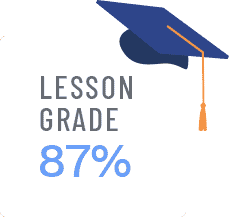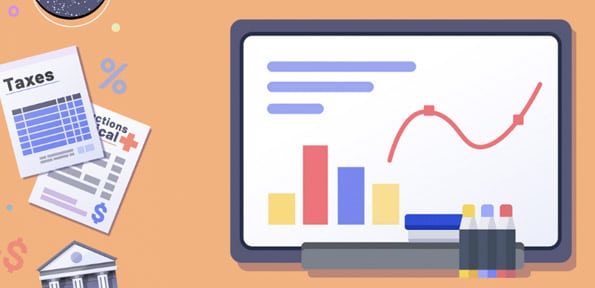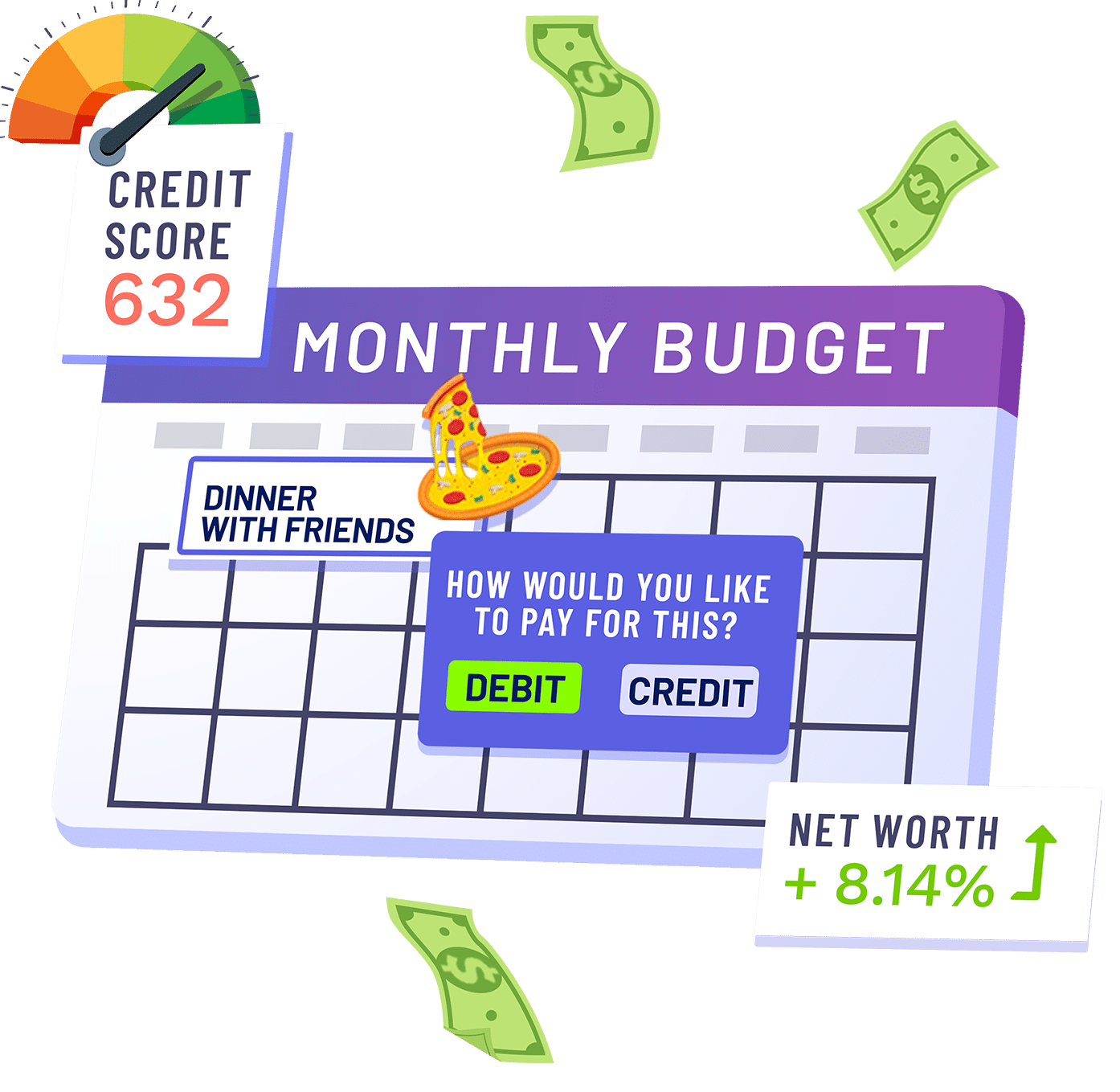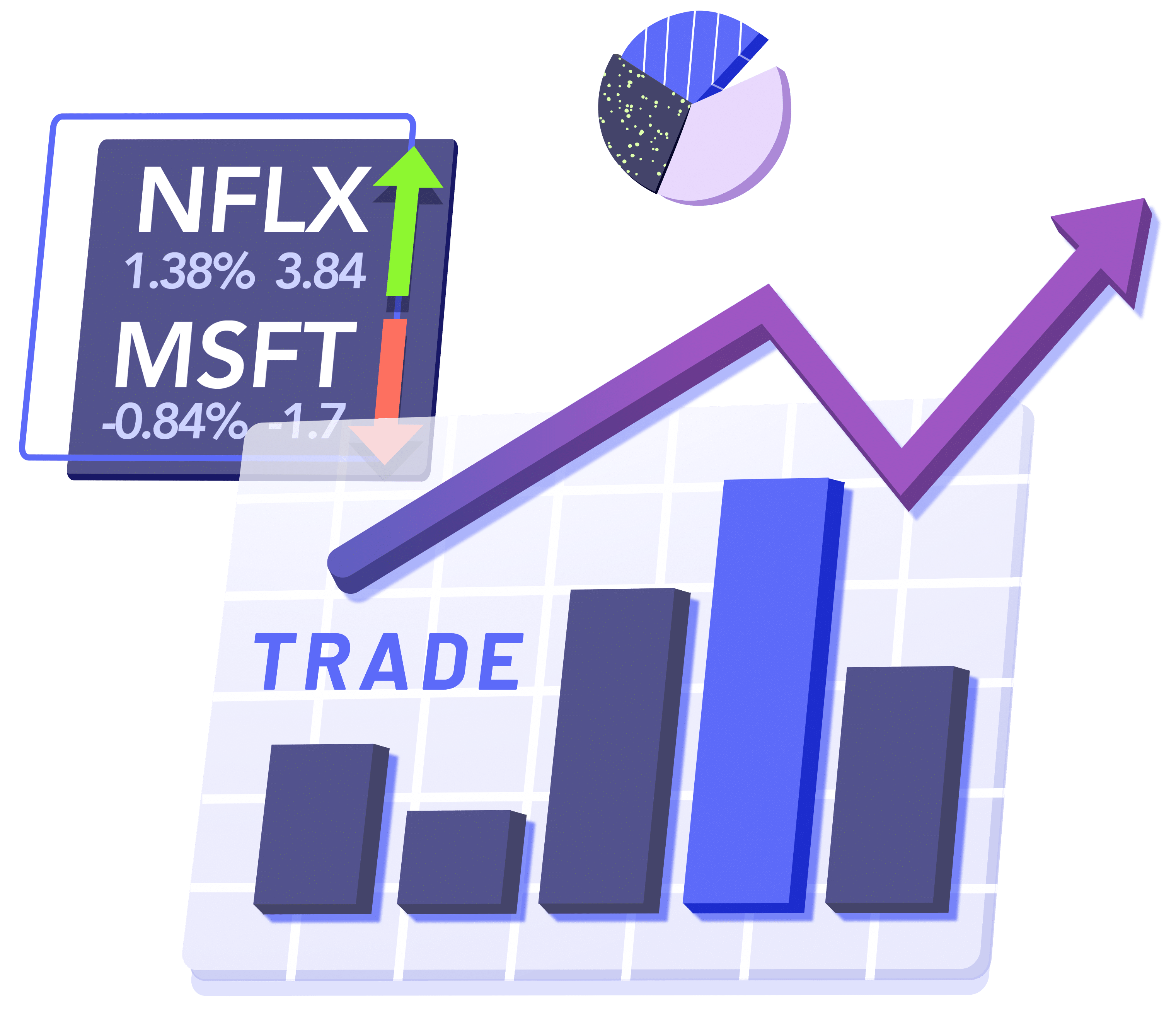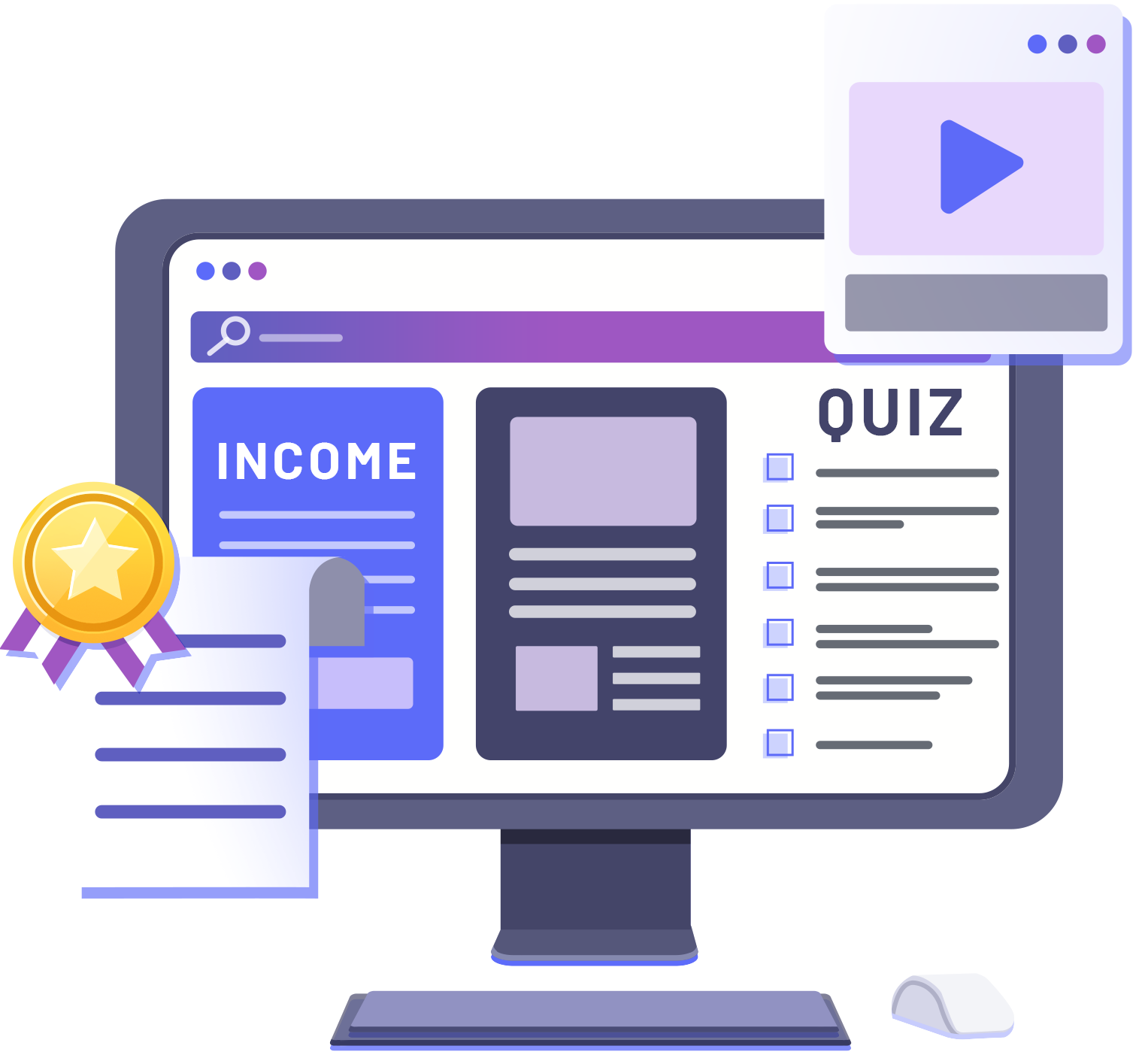| RELATING INCOME AND EDUCATION |
| | | | | |
| Relate how career choices, education choices, skills, entrepreneurship, and economic conditions affect income. |
Lesson – Career Development
Lesson – Work or Study
Lesson – Starting a Business
Lesson – The Business Cycle
Lesson – The Importance of Interest Rates
| | | | | |
| Describe the unique characteristics of both a job and a career. |
Lesson – Career Development
| | | | | |
| Identify and understand factors affecting income. |
Lesson – Income and Compensation
| | | | | |
| Understand how employee benefits relate to income. |
Lesson – Income and Compensation
Lesson – Employer and Employee Rights and Responsibilities
| | | | | |
| Examine how income affects choices and spending decisions. |
Budget Game – Core Component
Lesson – Spending and Savings Plans
| | | | | |
| Investigate how individual skills and abilities can be applied to a career choice. |
Lesson – Career Development
| | | | | |
| Discuss concepts associated with taxes and income. |
Budget Game – Core Component
Lesson – Taxation Overview
Lesson – Tax Filing and the Form 1040
| | | | | |
| Identify the origin and purposes of the payroll deduction process. |
Lesson – Payroll Best Practices
| | | | | |
| Identify taxable income and employee benefits. |
Lesson – Income and Compensation
Lesson – Employer and Employee Rights and Responsibilities
| | | | | |
| Research government policies and programs that are available to employees. |
Lesson – Unemployment and other programs
| | | | | |
| MONEY MANAGEMENT |
Activity |
Long-Term Game |
Comprehensive Chapter |
Short Lesson |
Interactive Calculator |
Graded Assessment |
| Formulate and compare money management choices that enable individuals to progress toward stated financial goals. |
Budget Game – Core Component
| | | | | |
| Prepare a budget for various applications(personal, family, business). |
Lesson – Budgeting
Lesson – Budgeting and Spending Strategies
Lesson – Cash Planning
Lesson – Short Term and Long Term Financing
| | | | | |
| Analyze and select appropriate financial institutions to assist with meeting various personal financial needs and goals. |
Lesson – Budgeting
Lesson – Banks, Credit Unions, and Savings and Loans
Lesson – Building Wealth
Lesson – Preparing for Retirement
| | | | | |
| Describe various financial products or services (ATM, debit cards, credit cards, checkbooks, etc.) and the most appropriate use of each. |
Lesson – What is Money?
Lesson – Debit Cards
Lesson – Credit Cards
Lesson – Short-Term Financing
| | | | | |
| Develop a plan to secure funding for a future event. |
Lesson – Planning for Long-Term Purchases
| | | | | |
| Analyze and discuss the long-range impact of setting personal financial goals. |
Lesson – Planning for Long-Term Purchases
Lesson – Preparing for Retirement
Lesson – Family Planning
Lesson – Career Development
| | | | | |
| Compare and contrast the influence of culture, traditions, location, and experience on personal financial goals. |
Lesson – Budgeting
Lesson – Analyzing Consumer Behavior
Lesson – Segmentation and Target Markets
| | | | | |
| Explain the history of existing forms of taxation at the federal, state, and local levels. |
Lesson – Taxation Overview
| | | | | |
| Identify reasons to comply with personal tax obligations and the consequences of not doing so. |
Lesson – Tax Audits
Lesson – When to hire a tax professional
Lesson – Tax Filing and the Form 1040
| | | | | |
| Describe the advantages and disadvantages of various sources of assistance with tax planning and filing. |
Lesson – Tax Audits
Lesson – When to hire a tax professional
Lesson – Tax Filing and the Form 1040
| | | | | |
| CREDIT AND DEBT MANAGEMENT |
Activity |
Long-Term Game |
Comprehensive Chapter |
Short Lesson |
Interactive Calculator |
Graded Assessment |
| Compare the benefits and costs of spending decisions. |
Budget Game – Core Component
Lesson – Pay Yourself First
Lesson – Spending and Savings Plans
| | | | | |
| Analyze information about products and services. |
Lesson – Researching Spending
| | | | | |
| Contrast a rapid access loan and a bank loan. |
Lesson – Short-Term Financing
Lesson – Good Debt, Bad Debt
| | | | | |
| Distinguish the financial benefits and services of different types of lending institutions. |
Lesson – Short-Term Financing
Lesson – Good Debt, Bad Debt
Lesson – Budgeting and Spending Strategies
| | | | | |
| Explain strategies of debt and credit management. |
Lesson – Managing Debt
Lesson – Good Debt, Bad Debt
| | | | | |
| Explain credit terminology. |
Lesson – Using Credit
Lesson – Credit Cards
| | | | | |
| Analyze sources of consumer credit. |
Lesson – Short-Term Financing
Lesson – Good Debt, Bad Debt
| | | | | |
| Explain options for payment on credit cards. |
Lesson – Credit Cards
Lesson – Automatic Payments
| | | | | |
| Differentiate between a credit card, charge card, and debit card. |
Budget Game – Core Component
Lesson – Debit Cards
Lesson – Credit Cards
| | | | | |
| Demonstrate balance sheet concepts: debit and credit. |
Lesson – Reconciling Accounts
Lesson – What is a Balance Sheet?
Lesson – What are Financial Records?
| | | | | |
| Compare advantages and disadvantages of various debt payment methods. |
Lesson – Short-Term Financing
Lesson – Good Debt, Bad Debt
| | | | | |
| Define terminology associated with mortgages. |
Lesson – Mortgages
Activity – Use the Buy vs Lease Calculator
| | | | | |
| Explain the factors affecting a “credit score.” |
Lesson – Credit Reports
| | | | | |
| Identify factors that affect creditworthiness and the purposes of credit records. |
Lesson – Credit Reports
| | | | | |
| Identify ways to avoid or correct credit problems. |
Lesson – Credit Reports
| | | | | |
| Compare and compute application of interest, compound interest, and amortization. |
Lesson – The Importance of Interest Rates
Activity – Use the Compound Interest Calculator
| | | | | |
| Compute the amount of interest paid over time when using credit. |
Activity – Use the Credit Card Payments Calculator
| | | | | |
| Calculate the cost of borrowing for various amounts and types of purchases. |
Activity – Use the Buy vs Lease Calculator
Activity – Use the Home Budgeting Calculator
Activity – Use the Car Loans Calculator
| | | | | |
| Explain the rights and responsibilities of buyers and sellers under consumer protection laws. |
Lesson – Consumer rights and responsibilities
| | | | | |
| Distinguish between the rights and responsibilities of buyers and sellers under consumer protection laws. |
Lesson – Consumer rights and responsibilities
| | | | | |
| List the purposes of debt. |
Lesson – Using Credit
Lesson – Credit Cards
Lesson – Good Debt, Bad Debt
| | | | | |
| Examine ways to leverage debt beneficially. |
Lesson – Good Debt, Bad Debt
Lesson – Buying a Car
Lesson – Mortgages
| | | | | |
| Identify different types of bankruptcy. |
Lesson – Bankruptcy
| | | | | |
| Examine ways to avoid bankruptcy. |
Lesson – Managing Debt
Lesson – Debt Management Services
Lesson – Consolidating Debt
Lesson – Debt Negotiation
| | | | | |
| Outline the implication(s) of bankruptcy. |
Lesson – Bankruptcy
| | | | | |
| Illustrate products and practices such as instant tax refunds and payday lending. |
Lesson – Short-Term Financing
Lesson – Good Debt, Bad Debt
Lesson – Taxation Overview
| | | | | |
| Describe predatory lending practices. |
Lesson – Short-Term Financing
| | | | | |
| PLANNING, SAVING, AND INVESTING |
Activity |
Long-Term Game |
Comprehensive Chapter |
Short Lesson |
Interactive Calculator |
Graded Assessment |
| Understand the concept of “time value” of money. |
Lesson – Time Value of Money
| | | | | |
| Apply the principle of “pay me first” to realistic scenarios. |
Budget Game – Core Component
Lesson – Pay Yourself First
| | | | | |
| Define the difference between income and wealth. |
Lesson – What is Money?
Lesson – What is Wealth?
Lesson – Income and Compensation
| | | | | |
| Apply the concept of “opportunity cost” to personal financial decisions. |
Lesson – Opportunity Cost
Lesson – Pay Yourself First
Lesson – What is Wealth?
| | | | | |
| Differentiate between various savings vehicles and their most effective utilization. |
Lesson – Budgeting
Lesson – Preparing for Retirement
Lesson – Building a Diversified Portfolio
| | | | | |
| Understand various investment options. |
Stock Game – Core Component
Investing101 Certification
Lesson – Building a Diversified Portfolio
Lesson – What is a Stock?
Lesson – What are Bonds?
Lesson – What is an ETF?
Lesson – What is a Mutual Fund?
| | | | | |
| Differentiate between income and investment growth. |
Lesson – Income and Compensation
Lesson – What is Wealth?
Lesson – Preparing for Retirement
Lesson – Building Wealth
| | | | | |
| Describe reasons for saving, reasons for investing, and entrepreneurship. |
Lesson – Starting a Business
Lesson – Planning Long-Term Purchases
Lesson – Preparing for Spending Shocks
Lesson – Pay Yourself First
Lesson – Preparing for Retirement
| | | | | |
| Describe differences between banks, investment firms, and financial planners. |
Lesson – Banks, Credit Unions, and Savings and Loans
Lesson – Debt Management Services
Lesson – When to hire a tax professional
| | | | | |
| Calculate short- and long-term returns of stocks and bonds. |
Stock Game – Core Component
Investing101 Certification
Activity – Use the Investment Return Calculator
Lesson – Why invest in Stocks?
Lesson – What are Bonds?
| | | | | |
| Explain the economic principle of supply and demand. |
Lesson – Supply and Demand Examples in the Stock Market
| | | | | |
| Compare budget to realized financial activities. |
Budget Game – Core Component
| | | | | |
| BECOMING A CRITICAL CONSUMER |
Activity |
Long-Term Game |
Comprehensive Chapter |
Short Lesson |
Interactive Calculator |
Graded Assessment |
| Examine individual differences in decisions made as a consumer. |
Budget Game – Core Component
| | | | | |
| Compare and contrast advertising for opinion vs. fact. |
Lesson – Foundations of Marketing
Lesson – Planning and Evaluating Business Advertising
Lesson – Ethics In Marketing
| | | | | |
| Compare, contrast, and compute interest rates and fees of various financial institutions. |
Activity – Use the Credit Card Payments Calculator
Lesson – The Importance of Interest Rates
| | | | | |
| Identify the components of completed written and verbal contracts. |
Lesson – What makes a contract valid?
| | | | | |
| Explain why contracts are used. |
Lesson – What makes a contract valid?
| | | | | |
| Analyze the elements and laws associated with fraud. |
Lesson – Protecting Against Fraud
| | | | | |
| Identify resources that can be used in making consumer decisions. |
Lesson – Researching Spending
| | | | | |
| Explain the forms and functions of money. |
Lesson – What is Money?
| | | | | |
| Compare the value of goods or services from different sellers. |
Lesson – Researching Spending
| | | | | |
| Demonstrate aspects of being a responsible consumer. |
Lesson – Consumer rights and responsibilities
| | | | | |
| COMMUNITY AND FINANCIAL RESPONSIBILITY |
Activity |
Long-Term Game |
Comprehensive Chapter |
Short Lesson |
Interactive Calculator |
Graded Assessment |
| Classify individual, social, and cultural differences in understanding and use of money and other financial resources. |
Lesson – Comparative Economic Systems – Capitalism, Socialism, and Communism
Lesson – International Trade
Lesson – Analyzing Consumer Behavior
Lesson – Segmentation and Target Markets
| | | | | |
| Analyze attitudes, assumptions, and patterns of behavior regarding money, saving, investing, and work. |
Lesson – Pay Yourself First
| | | | | |
| Differentiate legal and ethical bases for making personal and societal financial decisions. |
Lesson – Business Ethics Overview
Lesson – Ethics In Marketing
Lesson – Government impact on the economy
Lesson – Property Rights
Lesson – Protecting Against Fraud
| | | | | |
| Contrast cost-benefit and opportunity-cost. |
Lesson – Opportunity Cost
Lesson – Pay Yourself First
Lesson – What is Wealth?
| | | | | |
| Compare informed and responsible actions in addressing significant personal financial literacy questions/issues. |
Budget Game – Core Component
| | | | | |
| Demonstrate the concept and forms of taxation and its role in public activities/initiatives. |
Lesson – Taxation Overview
| | | | | |
| Illustrate how the economic system of production and consumption may be a means to achieve other significant societal goals. |
Lesson – Labor and Productivity
| | | | | |
| Examine the implications of legal and ethical behavior when making personal financial decisions. |
Lesson – Consumer rights and responsibilities
Lesson – Protecting Against Fraud
Lesson – Risk
| | | | | |
| Speculate about the impact of global economic events on personal financial planning. |
Lesson – The Business Cycle
Lesson – Stock Market Crash of 1929
Lesson – Inflation
| | | | | |
| Demonstrate the consequences of consumer citizen decisions and actions on the economy, broader society, and the environment. |
Lesson – Analyzing Consumer Behavior
Lesson – The Business Cycle
Lesson – Stock Market Crash of 1929
Lesson – What is Economics?
| | | | | |
| Compare and contrast the importance and impact of business, government, and consumer fiscal responsibility. |
Lesson – Fiscal Policy Explained
| | | | | |
| Connect the role of philanthropy, volunteer service, and charities to community development and quality of life. |
Lesson – Chartible Giving
| | | | | |
| RISK MANAGEMENT |
Activity |
Long-Term Game |
Comprehensive Chapter |
Short Lesson |
Interactive Calculator |
Graded Assessment |
| Predict the impact of loss associated with different types of financial risk. |
Lesson – Risk
Lesson – Opportunity Cost
Lesson – Investing Strategies
Investing101 Certification
| | | | | |
| Explain how to reduce financial risk to self, family, and community. |
Lesson – Building a Diversified Portfolio
Lesson – Health Insurance
Lesson – Life Insurance
| | | | | |
| Identify ways to manage the possibility of financial loss. |
Lesson – Preparing for Spending Shocks
| | | | | |
| Describe the need for and value of different types of insurance. |
Lesson – Health Insurance
Lesson – Life Insurance
Lesson – Renter’s Insurance
Lesson – Home Owner’s Insurance
Lesson – Car Insurance
| | | | | |
| Identify factors to consider when determining the amount of protection needed. |
Lesson – Health Insurance
Lesson – Life Insurance
Lesson – Renter’s Insurance
Lesson – Home Owner’s Insurance
Lesson – Car Insurance
| | | | | |
| Identify strategies to lower insurance costs. |
Lesson – Health Insurance
Lesson – Life Insurance
Lesson – Renter’s Insurance
Lesson – Home Owner’s Insurance
Lesson – Car Insurance
| | | | | |
| Apply opportunity-cost analysis to selected financial situations. |
Lesson – Opportunity Cost
Lesson – Pay Yourself First
Lesson – What is Wealth?
| | | | | |
| Explain why it is important to develop plans for protecting current and future personal assets against financial loss. |
Lesson – What is Wealth?
Lesson – Building Wealth
Lesson – Home Owner’s Insurance
Lesson – Planning for Retirement
| | | | | |




